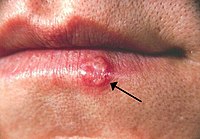
Photo from wikipedia
Introduction In spite of antiviral treatment, herpes simplex encephalitis (HSE) remains associated with a poor prognosis and often results in neurological impairment. The B cell response in HSE is poorly… Click to show full abstract
Introduction In spite of antiviral treatment, herpes simplex encephalitis (HSE) remains associated with a poor prognosis and often results in neurological impairment. The B cell response in HSE is poorly understood. The objective of this study was to identify, in a patient with HSE, B cell clones in cerebrospinal fluid (CSF) cells and peripheral blood mononuclear cells (PBMCs) that expanded between two different time points during the course of infection. Methods CSF cells and PBMCs were sampled from a HSE patient at two time points 5 days apart. B cells were analyzed using single-cell immune profiling (CSF cells) and conventional deep immune repertoire sequencing (PBMCs). Results We identified CSF B cell clones that expanded from time 1 to time 2. Some of these B cell clones could also be found in the peripheral blood. We also report the corresponding B cell receptor (BCR) sequences. Conclusion In our patient, HSE resulted in an intrathecal B cell response with expanding CSF clones. We report the B cell receptor sequences of several expanding and dominating clones; these sequences can be used to create recombinant antibodies. Even though the antigen specificity of these expanding clones is unknown, our findings suggest that an adaptive immune response in the central nervous system contributes to repelling herpes simplex virus infection in the brain.
Journal Title: Neurology and Therapy
Year Published: 2022
Link to full text (if available)
Share on Social Media: Sign Up to like & get
recommendations!